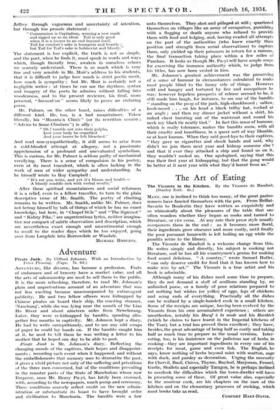The Art of Eating
The Vicomte in the Kitchen. By the Vicomte de Mauduit. (Stanley Nott. Os.) MANY, one is inclined to think too many, of the great gastro. nomers have fancied themselves with the pen. From Brillat- Savarin to Boulestin they have written so exquisitely and so whimsically about the pleasures of the table that one often wonders whether they began as cooks and turned to literature, or vice versa. At any rate their prose style usually overpowers them in the end : as it becomes more florid, their ingredients grow obscurer and more costly, until finally the poor pursuant housewife is left boiling an egg while the pundits retire to the library.
The Vicomte de Mauduit is a welcome change from this. He writes simply and directly, his subject is cooking not literature, and he has all his countrymen's genius for making food sound delicious. " A country," wrote Samuel Butler, " can only deserve credit for food that it has known how to make nice by art." The Vicomte is a true artist and his book is admirable.
Although many of his dishes need some time to prepare, they do not demand a staff of scullions standing by, an unlimited purse, or a family of poor relations prepared to eat nothing but whites (or yolks) of eggs, legs of chickens and scrag ends of everything. Practically all the dishes can be realized by a single-handed cook in a small kitchen. Some of the receipts are unique, having been evolved by the Vicomte from his own accumulated experience ; others are unorthodox, notably his Boeuf a la mode and his Borshich (which he claims to have learnt in the Imperial kitchens of the' Tsar), but a trial has proved them excellent ; they have, besides, the great advantage of being half as costly and taking half as much time to prepare as the usual versions. Inter- esting, too, is his insistence on the judicious use of herbs in cooking—they are important ingredients in every one of his receipts for meat, game and even fish. The English, he says, know nothing of herbs beyond mint with mutton, sage with duck, and parsley as decoration. Urging the necessity for Chervil, Basil, Chives, Thyme, Bayleaf, Marjoram, Fennel, Garlic, Shallots and especially Taragon, he is perhaps inclined to overlook the difficulties which the town-dweller will have in procuring some of these. Of great -value also, especially to the amateur cook, are his chapters on the care of the kitchen and on the elementary processes of cooking, which most books take as read.
COMFORT HART-DAVIS.










































 Previous page
Previous page